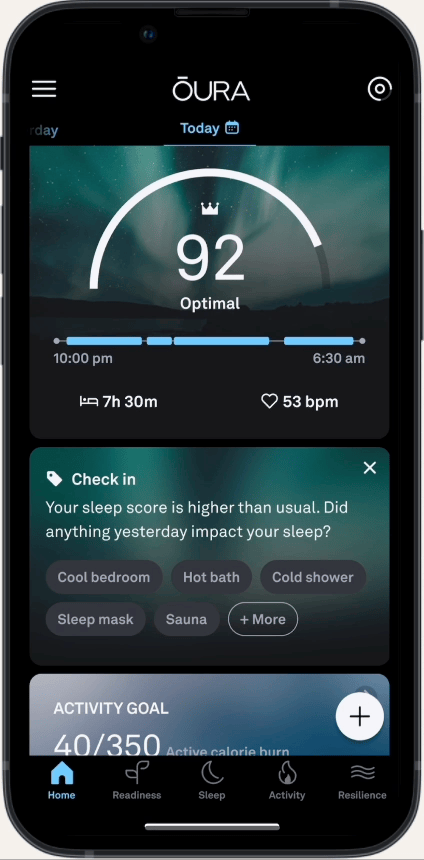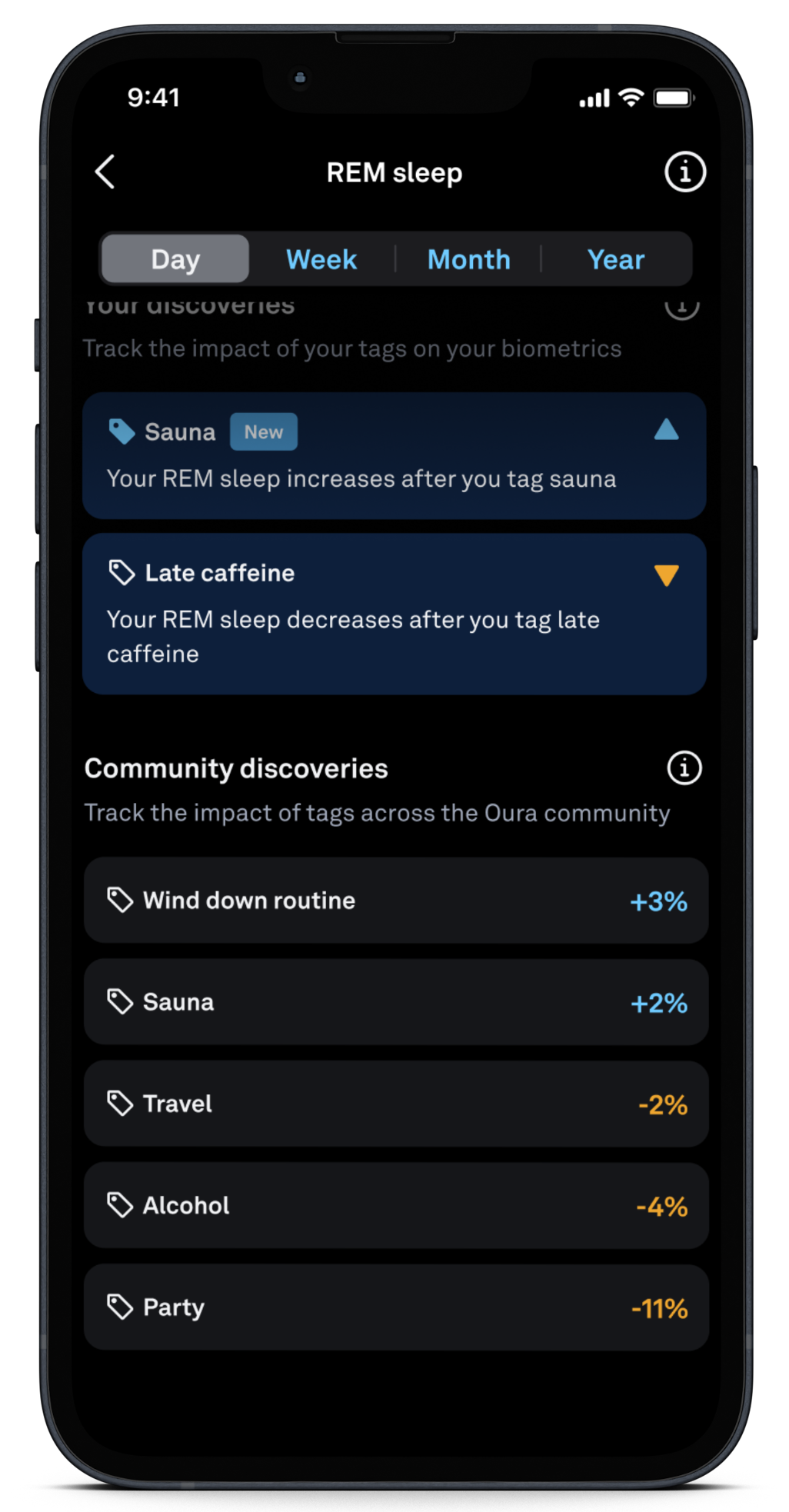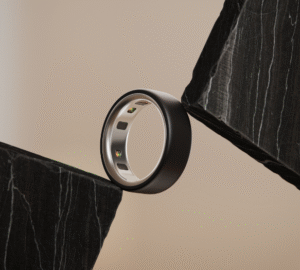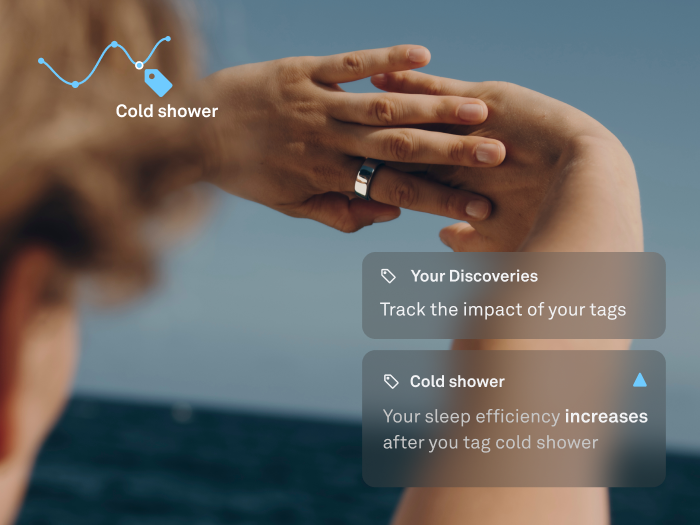Curious if your nightly meditation increases your REM sleep? Or if that cold plunge is worth the pain for a boost in heart rate variability? Up to now, Oura members have been able to uncover correlations like these between their habits and their biometrics using the Tags and Trends features.
Now, the Discoveries feature makes it easier and more informative to see how your tagged habits correlate with changes in your health and well-being.
Developing Discoveries
As a personal health companion, Oura provides accurate biometric data as well as data-driven guidance for members at all stages of their health journey. The goal of Discoveries is to make it easier than ever for members to interpret how behaviors impact their biometrics.
The Discoveries feature was born from member feedback. “It can be challenging for members to identify patterns in their behaviors and biometrics,” says Ashley Hopkins, Senior Product Designer at Oura who worked on the feature. “You may have had your suspicions about what’s working or not, but now Discoveries will do all the hard work for you.”
How Discoveries Work
Discoveries help you understand how your daily habits and health conditions impact your health by analyzing the effects of different tags on your biometrics. There are two types of discoveries you’ll find in the Oura App: Personalized discoveries and Community discoveries.
 Personalized Discoveries
Personalized Discoveries
Personalized discoveries show you how specific habits or events that you tag — such as travel, breathwork, a late meal, or your period — correlate with your personal biometrics. Note that custom tags and recurring tags are not currently eligible for discoveries.
When you use a tag often enough to make a meaningful association (this can range from 5 to 40 times), you’ll receive a “New discovery” notification. Tap on that notification, which will send you to the Trends view. Any available discoveries will be shown in “Your discoveries” and “Community discoveries” located beneath the trend graph.
Keep in mind that no two members will see the exact same Discoveries. For instance, while your friend may see that meditation increases their REM sleep by 20%, you may not experience the same meaningful change in your data, so you won’t see that discovery.
You can also access your personal discoveries by tapping Trends view for the following metrics:
- Readiness: Heart rate variability, respiratory rate, and resting heart rate
- Sleep: Deep sleep, REM sleep, sleep efficiency, and total sleep
For example, your personal discoveries may include:
- Your sleep efficiency lowers after you tag alcohol.
- Your REM sleep increases when you tag breathwork.
- The start of your period is associated with an increase in heart rate variability.
“While discoveries suggest connections between your tags and biometrics, remember that other factors can influence your data,” says Jake Sherman, Senior Data Scientist at Oura who worked on the feature. “Our model does not account for all possible variables, which means the correlations you see may be influenced by your other habits or external factors.”
What this means is this: The more things you tag, the better discoveries you’ll get. But it’s important to remember that the things you don’t tag (including behavior, lifestyle, or environmental changes — some that you may not even be aware of!) don’t get accounted for. So you might see that reading before bed improves your sleep, but this improvement may also be influenced by the fact you spend longer winding down for bed on days that you read.
READ MORE: Oura Tags: How to Use Tags to Unlock Greater Insights
Community Discoveries
 Community discoveries reveal the average impact of certain tags across all Oura members, revealing unique learnings from across a large population.
Community discoveries reveal the average impact of certain tags across all Oura members, revealing unique learnings from across a large population.
Community discoveries mean that enough members have seen a significant correlation between a tag and a biometric change for it to be shown. This means that while a connection may be established in the majority, it’s not guaranteed to work for you.
However, you can use it as a launching pad to try a self-experiment. For example, if you see that other members who tag meditation see a 10% increase in sleep efficiency, this could inspire you to try a meditation before bed.
“This type of experimentation can empower members with new strategies that can potentially lead to lasting, positive improvements in their health and well-being,” says Hopkins.
How to Use Discoveries to Spark Behavior Change
Discoveries turn Oura into more than just a data tracker — it’s your personalized health companion. By understanding how your actions affect your health, your daily choices become more informed, helping you continuously make habits that improve your well-being.
Discoveries in the Oura App can help you:
- Identify and reinforce positive habits: See which behaviors improve your health metrics and make them a regular part of your routine. Whether it’s regular sauna sessions or breathwork, Discoveries help you identify which habits lead to the best health outcomes for you, uniquely.
- Recognize and mitigate negative behaviors: Discoveries can help you understand the habits and actions that lead to unwanted health effects, like wine or a late-night meal. With this knowledge, you can make adjustments to minimize the negative impact (or choose not to — at least you’ll know!).
- Stay motivated: Knowing which habits are beneficial can encourage you to stay consistent with them — and consistency leads to long-term improvements in your mental and physical health.
Who Is Eligible for Discoveries?
Discoveries are available to Gen3 members who have at least 14 days and nights of data over the past 30 days. You must also have used a Tag enough times to reach a significant correlation, typically between 5 to 40 times. Currently, custom tags and repeating tags are not eligible.
LEARN MORE: Discoveries Help Center
About the Oura Experts
Ashley Hopkins is a senior product designer based in Brooklyn, NY. At Oura, she has focused on crafting experiences for content, tagging, and Women’s Health. Her goal as a designer is to craft elegant and practical solutions that empower people to understand and take control of their health.
Jake Sherman is a senior data scientist on Oura’s Activity team based in Seattle, WA. Prior to Oura, Jake led data science consulting engagements at Athena IT Solutions and built fashion recommendation systems at True Fit.











